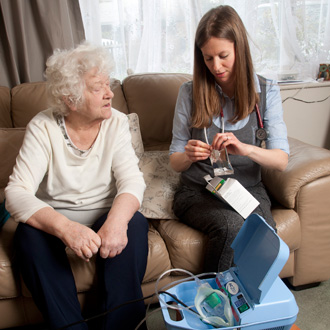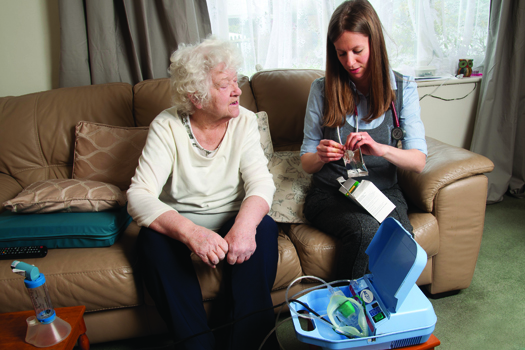Profile: Dr Hannah Bundock

Roles: GPSI in elderly care on community-based, GP-led virtual ward; GP locum; educator in community geriatrics
Hours worked per week: 7-9 sessions on the virtual ward, which runs from 9am to 5pm each weekday
Qualifications: MRCGP, MRCP, diploma in child health and diploma in geriatric medicine
09.00 I arrive at the office to do a virtual ward round. The ‘virtual ward’ is how we describe a local service whereby we manage patients in their own homes. It is one of three such wards in Harrow, north-west London, caring for elderly people with complex comorbidity in the community. We have a ward list, much like an elderly care inpatient list.
Each virtual ward covers a peer group of approximately 10 practices and is run by a GPSI leading a multidisciplinary team of a health and social care coordinator, consultants in geriatrics, psychiatry and palliative care, a social worker and a peer group GP chair. Patients with advanced and complex health problems are referred to us by their GP, and we provide them with intensive, holistic and comprehensive care tailored to their needs.
The first task is to review patients over the phone; we have access to their electronic GP records so we can view and document everything in the notes.

Visiting a patient from the virtual ward
I have worked on the ward for more than two years. The chance to design care around the patient and the opportunity to develop my clinical skills drew me to the role. I have since completed the diploma in geriatric medicine (DGM) and the MRCP, which have greatly influenced how I make initial assessments and manage frailty.
10.45 I visit a severely frail woman, a retired seamstress, who has multiple comorbidities and has spent most of the past 10 months in hospital due to recurrent urosepsis and episodes of severe hypoglycaemia. She needs a frame, as she can no longer walk independently. We discuss an anticipatory care plan (ACP) and she decides she does not want hospital admission again and wishes to die at home.
Visiting patients frequently helps to build a rapport and gain their trust, and allows me to broach the ACP more naturally than in the usual time-limited GP consultation. I enjoy learning about patients, what they enjoy and how their life was before their health problems. For me this is the best part of the job, getting to know patients as individuals and being able to achieve their goals with them.
A few weeks after my visit, the retired seamstress deteriorates despite treatment at home, and I visit her almost daily, liaising with the palliative care support team. She passes away peacefully and her family thanks us for enabling her to have end-of-life care where she wanted.
11.45 I do an initial assessment of a new patient in her home. This involves an in-depth geriatric assessment, which includes an extensive medical, social and psychiatric history, a multisystem examination and falls assessment.
The patient has been referred for not requesting her medication for months and repeatedly missing urgent appointments for suspected bowel cancer. When I visit I find that she and her sister, who she lives with, have little insight and both appear to have marked cognitive impairment. I suspect dementia and conduct a capacity assessment on the patient’s ability to decide how to manage her medication, which she fails.
Back at the office, we arrange for the rapid response team to prompt her medication for a few days and ask the social worker to review her case urgently. The GP also agrees to refer her sister to us, so we can assess her capacity.
14.30 I lead our fortnightly multidisciplinary team meeting, held at our largest GP practice. We work hard to create solutions, sometimes developing new care pathways. This helps us ensure care is tailored to the patient and avoids any duplication or omissions of care.
17.00 I complete a discharge summary of a woman with dementia who was referred after calling emergency services more than 20 times in a month, due to loneliness and abdominal pain. It is satisfying to be able to record she is no longer feeling depressed or repeatedly ringing 999. It’s an example of the difference this dedicated service is making.
GPs are likely to undertake increasingly complex elderly care as the population ages and fewer geriatricians have the opportunity to do domiciliary assessments. I believe the DGM offers the framework and the knowledge to meet this challenge.
Patient details have been altered

















